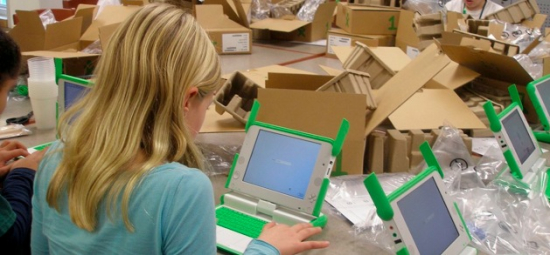
I am Gerald Ardito, a doctoral student at Pace University, and have been studying the impact that the XO Laptops and their Sugar software have on the classroom environment of a suburban, 5th grade cohort in The Shape of Disruption.
While my full data analysis is still in progress, the preliminary findings suggest that the use of these laptops and software strongly support these students becoming more independent as learners. For my research, I defined independent learner in terms of how the students work by themselves or with one another to do what is expected of them.
A little bit about our XO laptop program: We have about 125 students using the XOs in 5 classrooms. Each classroom selected 4-5 students as a "Tech Team." Their job is be classroom "experts," both in the basics of Sugar and the XOs, as well as in whatever activities the teachers want to use for various classroom projects. This part of the program has been really successful.
Spontaneous Helping Interactions
From the very beginning, we have observed a ripple effect. As soon as we introduce to a group of students a new skill or project the same thing happens: the kids that "get it" first, swoop around to show what they have learned, spontaneously, to their fellow students. We saw this happen over and over again in every classroom.
To quantify this phenomenon, we videotaped a set of XO based classroom sessions, so that we could really look at what I call "helping interactions," which are occasions when the students either:
- ask the teachers for help,
- ask another student for help, or
- students offer help to other students without being asked.
What we have seen is that roughly 4-5 times as many of these helping interactions take place between students, versus those that take place between teachers and students. This means that as these fifth graders use the XO's and Sugar, they spend much less time asking their teachers for help and more time helping one another. This-effect is greatly enhanced by the teachers' behavior.
The more the teachers facilitate and empower these student to-student interactions, the better. This last finding emphasizes that we are looking at a whole classroom ecology, which is too often, I believe, de-emphasized when talking about technology in the classroom.
Again, the entire data analysis for this study is not yet completed, but these initial findings do indeed seem promising.


I've watched very similar interactions with my students, wich used laptops in a VRML/X3D project recently. The more savvy one helped the others, they actively exchanged tips and competed (in a good, colaborative way) to get the best results .
This is very interesting, but I guess is not really surprising that kids (and older people) turn/help first to their peers before they go to teacher/supervisor.
Are you saying that this is happening in higher frequency with the XOs compared to other assignments that allow/promote interaction?
The other consideration is that peer learning could be less efficient and occasionally plain wrong (see urban/scientific myths). Is efficiency/accuracy also a parameter in your study?
I'm sure one could ask many more questions... Is just that any kind of coherent studies is something really missing from the OLPC project and everyone is eager to find out as much as possible :-)
Hopefully we'll here more about your work!
I meant, will HEAR about your work (hopefully here :-)
(the moment you press submit, you see the typos :-)
Hola!
Sorry to bust your bubble, but getting students together would find the same interaction no matter what joint task you asked of the students.
A long time ago students used to go to computer labs before laptops were readily available. I formerly worked for Temple Hospital in Philadelphia and was allowed into Temple University's computer lab to use their machines. It was there that I learned how to use Lotus123 and the students would explain to others there how to make an exploded pie graph!
GregYohn, I don't think anyone claims the laptops are the only way to improve education or to reach any specific learning goals. Instead, the laptops would turn out to be very useful if they significantly increased the social construction in the class room, for example.